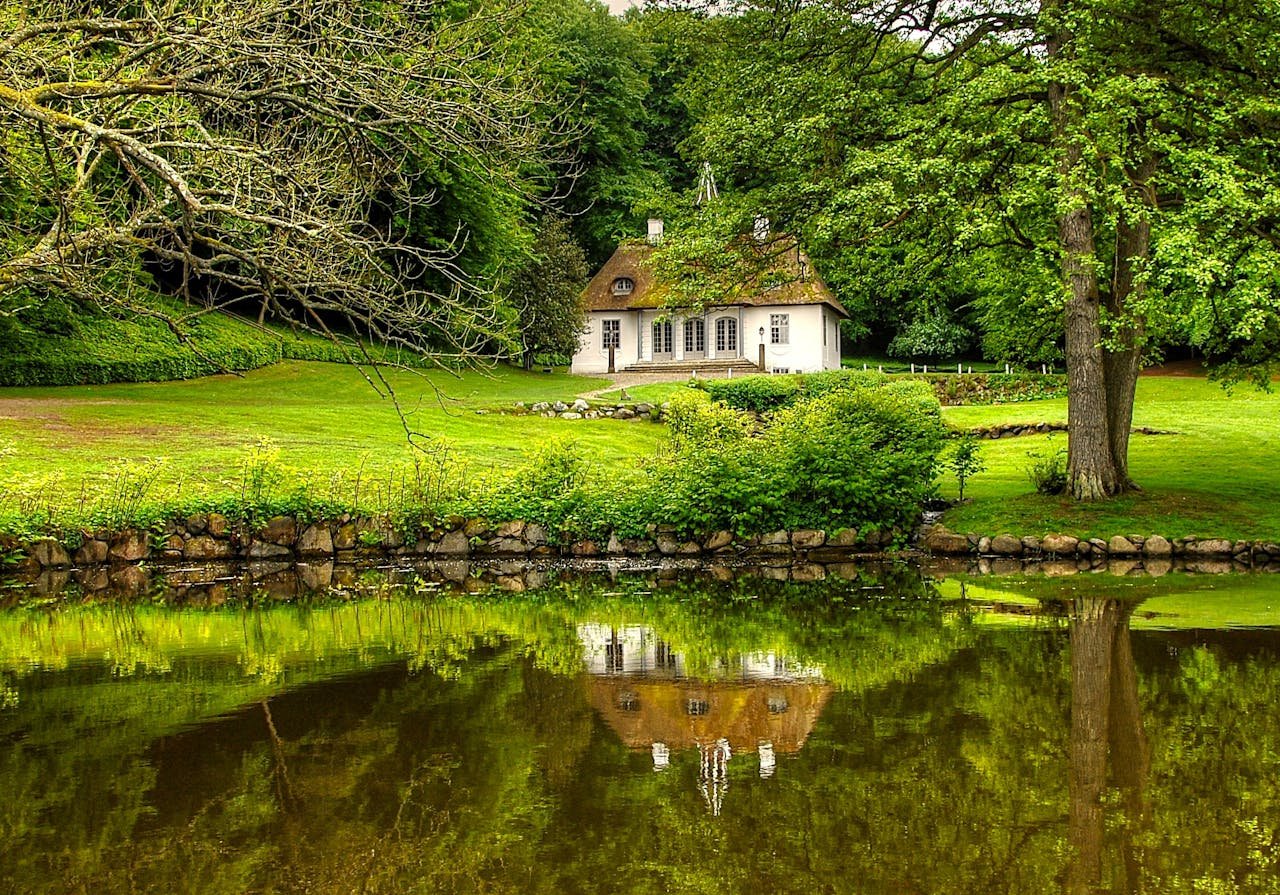Table of Contents
Introduction

Have you been feeling stressed, anxious or run down lately? If so, one of the best antidotes could be something as simple as spending more time in nature. While the busyness of modern life often keeps us cooped up indoors for days at a time, an increasing body of scientific evidence suggests that regular exposure to the natural world can have profound benefits for our physical and mental well-being.
From reducing blood pressure and boosting immunity to increasing feelings of happiness and promoting faster healing, the impact of nature on human health is nothing short of remarkable.
Let’s take a deep dive into the science behind why being in nature is so good for us.
Some Of The Health Benefits Of Being In Nature Include:

Reduces Stress and Anxiety
Perhaps the most well-known benefit of nature is its ability to alleviate stress and anxiety. When you spend time outside, away from the noise, crowds and artificial environments that can trigger the body’s stress response, something powerful happens. The levels of cortisol, the body’s main stress hormone, begin to decrease, while endorphin levels (which are linked to positive feelings) rise.
A 2019 study found that just 20 minutes spent in a park setting was enough to significantly reduce cortisol levels. Other research has shown that people who live closer to green spaces like parks and forests tend to be happier and experience lower incidences of mood disorders compared to those who don’t.
Promotes Healing and Pain Relief

Did you know that spending time outdoors can actually help you heal faster from injury or illness? Research on hospital patients has revealed that those who had views of nature from their rooms experienced shorter postoperative stays took fewer potent painkillers and had lower scores for pain compared to patients without nature views.
Other studies have found that activities like forest bathing (mindfully connecting with nature) can promote faster healing from surgeries and treatments by reducing inflammation, a key driver of diseases from arthritis to cancer. Natural settings also seem to have intrinsic pain-relieving properties, perhaps by eliciting positive feelings that take the mind off discomfort.
Boosts Immunity

While modern society tends to view bacteria and microbes as enemies to be eradicated, mounting research suggests that exposure to the millions of microscopic life forms present in natural areas may actually be vital for robust immune function. When we spend too much time in overly sterile indoor environments and surround ourselves with antimicrobial products, the immune system doesn’t get the workout it needs to stay balanced and ready to fight off pathogens.
Interacting with the diverse microbiomes present in forest soils, lakes and other natural habitats helps train the immune system through repeated, low-level exposure. This hygiene hypothesis may explain why children raised in rural environments tend to have lower risks for autoimmune conditions like inflammatory bowel disease, multiple sclerosis and allergies.
Improves Cognitive Function

Do you ever feel sluggish, foggy-headed or unable to concentrate after spending hours working in an office? Studies show that being in nature can help clear your head by improving cognitive performance and productivity. One pioneering study found that students scored 20% better on a cognitive test after spending an hour interacting with nature, compared to peers who remained in the city.
There are likely a few factors at play here. First, natural settings tend to rivet our attention through phenomena like clouds drifting across the sky or the motions of wildlife — a restorative form of attentiveness that gives the cognitive part of our brain a break. Secondly, the higher oxygen levels and soothing sounds of the outdoors like birdsong and breezes positively affect blood pressure, heart rate and stress hormones, optimising the physiological state for clear thinking.
Promotes Weight Loss

Need another reason to get outside more frequently? Spending time in nature may make it easier to achieve and maintain a healthy body weight. Some evidence links sedentary behaviour to increased rates of obesity, while increased time outside tends to correlate with more physical activity.
But intriguingly, several studies suggest that just being around greenery may independently aid in weight loss and reducing body fat — even without a corresponding increase in physical exercise. The theory is that exposure to nature downregulates cravings and the production of hormones like leptin which drive hunger. The microbes, fresh air, sunlight and visual aspects of being outside also appear to boost metabolism and promote the growth of healthy gut bacteria linked to lower weight.
Vision and Sleep Benefits

Spending hours staring at screens and digital devices strains the eyes, which are forced to work harder to focus and process artificial light sources. By contrast, natural environments give our eyes a much-needed break by allowing them to relax and focus at different distances. The soft, dappled lighting of forests and natural landscapes rich in greens and blues have been shown to increase blinking rates and pupil dilation while decreasing glare — all factors that reduce visual fatigue.
Furthermore, insufficient exposure to sunlight during the day can disrupt the body’s circadian rhythms and production of melatonin, the sleep hormone. Camping and other outdoor activities expose us to bright morning sunlight that helps regulate our body clock, setting us up for higher-quality sleep at night. Increased physical activity in nature also promotes better sleep through exercise and body temperature changes.
The Biophilia Hypothesis

So why is being in nature so revitalising, grounding and impactful for our health? According to the biophilia hypothesis proposed by biologist E.O. Wilson, humans have an innate, genetically-based affiliation with the natural world that evolved over hundreds of thousands of years. Feeling a deep-rooted connection to other living systems in nature is theorised to be psychologically restorative for us.
When we find ourselves surrounded by concrete jungles and human-made environments, we become disconnected from the sights, sounds, smells and textures that defined the lives of our hunter-gatherer ancestors. While these modern spaces may be efficient, they are also profoundly alienating for the human mind and spirit on a subconscious level.
Natural environments may resonate with us so deeply because they are the ecological contexts our brains became wired for over millennia of biological and cultural evolution. Despite our technological advances, we still have the same neural circuitry adapted for life in the wild. Perhaps that’s why so many of us feel a profound sense of rejuvenation, peace and homecoming when immersing ourselves in the natural world.
Tips for Forest Bathing and Cultivating Nature Connectedness

So how can you start reaping the many benefits of nature? For people living in cities or with busy lifestyles, it’s all about making a conscious effort to incorporate the outdoors into your daily or weekly routines.
Here are some tips:
- Forest bathing (known as shinrin-yoku in Japanese) is the practice of mindfully connecting with nature through your senses. Find a local park, trail or botanical garden and take a leisurely stroll, pausing frequently to touch trees, smell flowers, feel the breeze and listen to ambient sounds.
- Exercise outdoors. From trail running and hiking to cycling, swimming or simply walking around your neighborhood, make it a priority to get your workout in while surrounded by greenery.
- Bring nature indoors by keeping houseplants. Having living, and growing things around has been shown to lower stress and improve mood. Choose plants that are easy to care for like succulents or ZZ plants.
- Head for the beach or spend time near bodies of water, which have profoundly relaxing qualities owing to gentle sounds, smells, negative ions and open spaces.
- Camp in the wilderness away from artificial lights and reconnect with the sun and lunar cycles that governed human life for countless generations.
- Join a community garden and work on cultivating soil, plants and crops. Getting your hands dirty can be incredibly grounding.
- Keep it simple by finding a quiet green space to have your lunch or take a break during the workday.
- Let yourself be aimless and playful sometimes. Randomly explore, follow your curiosities and engage with the natural world like a child would through games, movement and whimsy.
The more ways you can meaningfully interact with nature, the better. While an occasional hike or trip to the park is beneficial, it’s the regular, repeated exposure that seems to produce the greatest positive impacts on mental and physical health over time.
Make Reconnecting With Nature a Priority

In our modern, urban lives, it’s all too easy to become entirely disconnected from the natural world that once cradled humanity. We sequester ourselves in air-conditioned homes, drive through cities in steel boxes, and spend most of our days working under harsh fluorescent lights.
But the research is clear — separating ourselves so completely from nature comes at a heavy cost for our health, happiness and cognition. Making a conscious effort to build greenery, living creatures and the restorative gifts of the outdoors back into our lives is one of the most empowering things we can do to optimise our overall well-being.
Conclusion

So open those curtains, roll down the windows, and carve out regular time to walk among trees, stones, soil and streams. Delight in the feeling of the warm sun on your face and the fragrance of flowers on a Spring breeze. Listen to birdsong, let your eyes take in the fractal patterns of leaves, and remember what it means to be a living creature on this breathtakingly beautiful planet.
When you actively nurture your connection to the natural world that birthed humankind, you open yourself to a profound stream of nourishment and healing that’s available to us all.
By making this commitment to nature, you’ll undoubtedly find yourself growing happier, calmer, and more grounded. What could be better for your health than that?

FAQs
What are some of the key health benefits of spending time in nature?
Some of the most remarkable health benefits of immersing in nature include reduced stress and anxiety, faster healing and pain relief, boosted immunity, improved cognitive function, better sleep, weight loss support, and relief for strained eyes and vision.
Why is nature so powerfully revitalising for our minds and bodies?
The biophilia hypothesis suggests humans have an innate, evolutionary-based need to connect with the natural world that nurtured our species over millennia. Being in nature allows us to re-attune with the sights, sounds, smells and textures that our brains and bodies became optimised for, providing a revitalising homecoming.
How can people living in cities or with busy lives make time for nature?
Practices like forest bathing, outdoor exercise, keeping houseplants, spending time near water, camping, community gardening, and taking breaks in green spaces can all help build nature connectedness into daily routines.
What are some of the physiological mechanisms behind nature’s health impacts?
Being in nature reduces stress hormones like cortisol while increasing endorphins, exposes us to beneficial microbes that prime the immune system, lowers inflammation, optimises circadian rhythms and melatonin production, and provides restorative sensory inputs.
How does prioritising time in nature compare to other health optimisation strategies?
While useful, many modern health hacks and lifehacking strategies are ultimately superficial compared to the holistic benefits of immersing in nature. Realigning with the natural world is the ultimate way to reboot our human minds and bodies to their evolutionary design.



